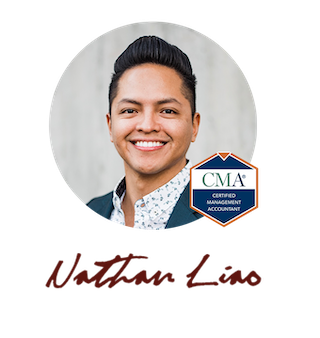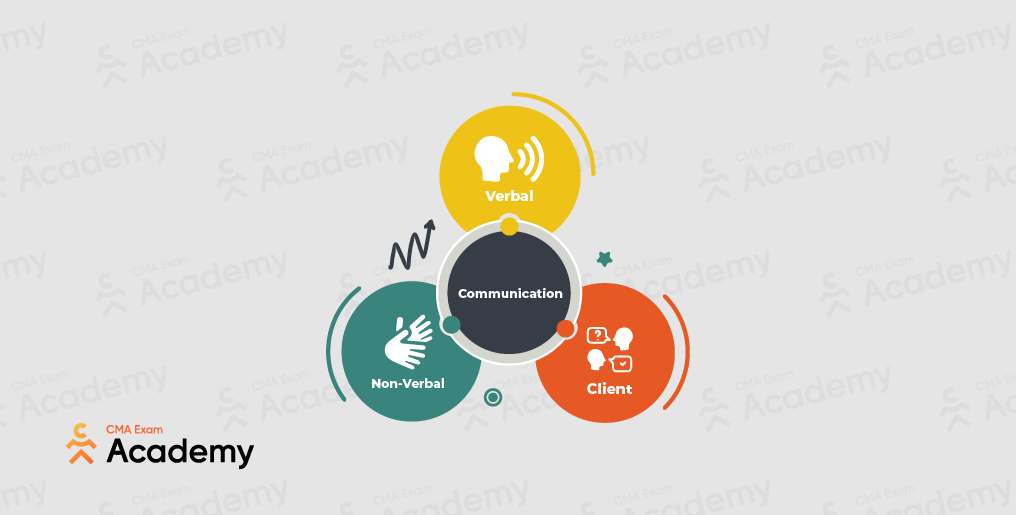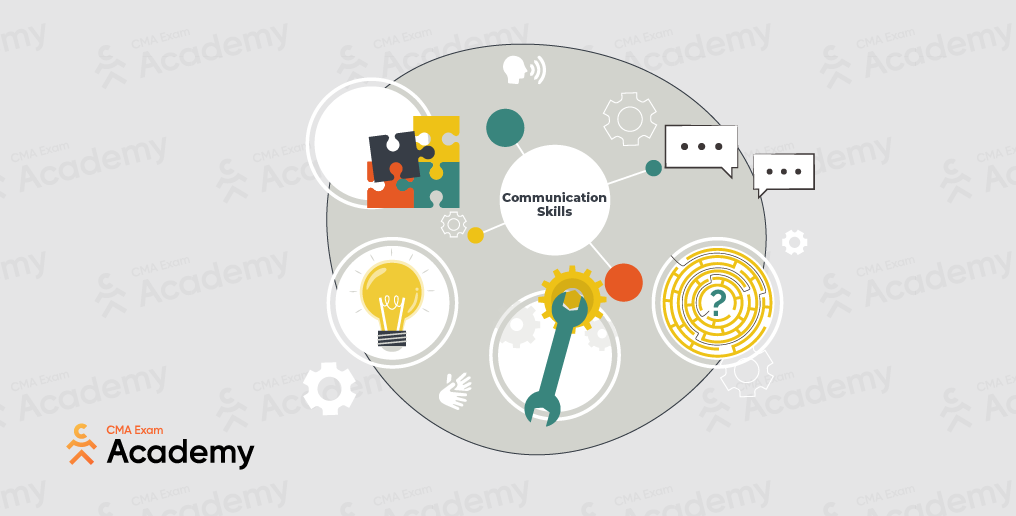As a professional accountant, you probably spend a lot of your time thinking about hard skills: numbers, formulas, software, and data analytics. But the truth is that soft skills are essential for accountants as well.
This is especially true if you are a management accountant, CFO, or in any position of leadership. Communication is one of the most important soft skills. It is an important leadership skill for CMAs and honing your communication abilities can positively benefit every area of your life.
Most accounting professionals get plenty of opportunities to practice basic communication skills. To advance in your career, however, you may need to master more advanced techniques including salary negotiation and public speaking.
If the mere mention of public speaking makes you uncomfortable, don’t worry. In this post, I’ll go over the basic communication skills for accounting and outline some tips for practicing public speaking so you can go after leadership positions and level up your career.
Why Is Communicating Important in Accounting?
There is a general misconception that all accountants are introverts. While there is little to no data supporting this belief, the truth is that between one-third and half the population are introverts. This means a significant number of professionals will likely have negative feelings about social interactions over the course of their careers.
Strong communication skills are traits all good accountants need, but this is especially true for anyone in leadership. Advancing to a managerial or supervisory position will certainly involve a good deal of communication with team members, upper management, board members, and clients.
So it stands to reason that it is a valuable competency worth investing in. There are a number of ways to do so, and we’ll get into them later in the article. But first, let’s explore the different types of type communication in accounting.
Types of Communication in Accounting
Like most other professions, accountants who possess a range of interpersonal skills will have an easier time advancing in their careers. Here are some of the different types of communication that accountants use at work.
Verbal Communication
One of the main forms of communication is verbal. This can be anything from reporting results or findings, sharing ideas in meetings, and describing tasks and roles to teammates.
You can practice verbal communication skills by actively listening and responding to your coworkers in a low-stakes situation. This includes break room chats as well as morning huddles.
As you learn to communicate through conflict and challenges in these less stressful situations, you’ll also be able to apply those lessons to the boardroom.
Non-Verbal Communication
Studies have shown that approximately 55% of communication is nonverbal. This means that even if you’re saying the right things, your message could fall short if you haven’t mastered the art of body language.
The same study found that a further 38% of communication is vocal but nonverbal, meaning the way you say things is often more important than the words themselves.
Body language is often instinctual; in many cases, it can be hard to remember to sit up straight or uncross your arms from your chest. Start practicing better nonverbal communication in the same way that you practice verbal communication—with friends, family, and people you feel more comfortable around.
Eventually, you’ll start to adopt certain postures habitually, meaning you’re more likely to walk with confidence during high-stress situations such as interviews or performance reviews.
Client Communication
Client relationships require a lot of interpersonal skills, but communication is the primary one. You’ll also need to practice problem-solving and empathy in order to relate to others and help them with whatever challenges they’re facing.
If you can make a client feel comfortable, heard, and confident in your abilities, they are more likely to trust you and purchase your services. They’re also more likely to recommend you to others.
What Communication Skills Are Needed for Accounting?
So we’ve established a few different types of communication. What about individual communication skills? Let’s get into it.
Public Speaking
This is perhaps the most intimidating skill on this list. It involves a lot of preparation and confidence. For many, this is one of their biggest fears.
If you want to improve your public speaking abilities, try following these tips:
- Understand your audience and curate your speech for them
- Get organized
- Practice as much as possible
- Rehearse in front of someone and ask for feedback
- Stay adaptable and open to real-time feedback during the speech
- Bring notes but don’t read from them
- Have fun, use humor, and be yourself
While I’d love to say there’s a miracle trick that will help you overcome your fear of public speaking, I’m afraid such a thing doesn’t exist. The best way to become a better public speaker is by practicing. It’s that simple.
Active Listening
Listening has been found to be the communication skill we use most often, but many people don’t see it as something that can be improved. Active listening, in particular, is a critical skill for leaders. It can lead to better relationships with your team, clients, and upper management.
Great listening skills can also lead to:
- Better connections with others
- More learning opportunities
- Consistent positive outcomes from social interactions
- Improved adaptability
So it stands to reason that you should put some effort into improving your active listening abilities. Here are some tips:
- Focus on body language: Always make an effort to demonstrate your engagement in another person with your body language (remember, an estimated 55% of communication is nonverbal). This means making eye contact and positioning yourself to face them when they speak.
- Never interrupt: Sometimes, it takes a journey to get a complete thought out. Try to resist the urge to assume what another person is thinking. Wait until they’ve completed their thought before jumping in with a response.
- Reserve judgment: The goal of active listening is to encourage more meaningful contributions from the person you’re engaging with. Judgment is a killer of creativity, so try to limit any judgemental thoughts. They don’t serve a purpose here.
- Pay attention to others’ body language: Consider the nonverbal cues of the person you’re speaking with. Are their arms crossed? Are they slouched? Interpreting their nonverbal cues can tell you a lot about what they’re really saying.
- Repeat after them: Paraphrase or repeat what they’re saying to show them you’re paying attention. Ask for clarification if anything is unclear.
- Ask questions: Often, the point of active listening isn’t to immediately solve a problem but to understand something deeper. The best way to do this is by asking meaningful, open-ended questions.
Clarity
This is a written and verbal communication skill, and it’s particularly important with public speaking. In the early days of my career, I had a tendency to over-explain. And since most people are polite, they won’t interrupt. This often left me speaking for long periods of time.
The easiest way to achieve clarity is with organization and precision. Here’s what I mean by that: Organize your thoughts before you speak. Then select the most precise, active language to communicate your point in the simplest way.
Adaptability
In any exchange involving communication, adaptability is key to ensuring your message is understood. This is particularly important in public speaking. Your ability to adapt to the audience when giving a speech could make or break the success of your presentation.
To become more adaptable in your communication style, start by being observant. What is the audience’s body language telling you? Are they asking questions because they’re engaged or because they’re confused?
If you can assess how your communication is coming across in real-time, you’ll be better equipped to make the adjustments needed to improve.
Asking Questions
Relevant, open-ended questions are the key to more meaningful conversations. This is because they invite others to lean in.
Asking a question during a presentation can increase audience engagement. Inquiring about a process or task during a conversation with your boss can demonstrate curiosity. And checking in on the people on your team with questions about their well-being can foster trust.
The best part about questions is that they are a conversation initiator, meaning you don’t need to find natural ways to bring them up in the middle of an exchange. You can just walk up and spark up a conversation with one.
Giving and Receiving Feedback
Feedback is a vitally important resource for self-improvement. But that doesn’t mean it’s easy to give or receive.
As a professional, you’re likely already familiar with the process of receiving feedback. While I struggled with this when I was younger, I now look at feedback as a gift that allows me to grow and develop professionally.
It can be difficult to receive feedback, but it is equally as difficult to give feedback. No one wants to hurt feelings or damage someone’s confidence. That’s why, as a leader, it’s your job to give constructive feedback tactfully and with care.
Here are my best tips for giving feedback:
- Always lead with a compliment
- Don’t criticize without providing context, explanation, and suggestions
- Offer the opportunity to continue the conversation
- End with a compliment
Feedback with a balance of criticism and compliments is more likely to be received and implemented. It has the added benefit of building trust between you and your team, as well.
Improve Your Communication Skills and Become a CMA
If you’re on the journey of improving your skills and advancing in your career, communication is a great place to start. That’s because becoming an expert communicator can unlock opportunities to learn more skills, meaning it provides compounding benefits.
For those who are considering pursuing a professional certification, the CMA is an affordable option that teaches a wealth of technical knowledge. But in order to earn the high-level leadership position you want, you’ll have to master soft skills like communication as well.
I won’t lie to you: the process of becoming a CMA is a challenge. That’s why the designation is synonymous with excellence. But don’t let the exam process deter you from investing in your future. With an earning potential approximately 58% higher than non-CMAs, the CMA is a great way to work toward your financial future.
Before you start studying for the exam, be sure to take a look at my CMA 16-Week Accelerator program. My students have a pass rate that is nearly double that of the global average. Plus, the program is designed to save you hours of study time and it’s guaranteed to help you pass the exam.

Hi, I’m Nathan Liao (aka the CMA Coach)! For the last 10 years, over 82,000 accounting and finance pros came knocking at my door seeking guidance and help. If you’re also aiming to conquer the CMA exam on your very first try—without wasting away time or money—you’ve found your ultimate guide. Dive in deeper to discover more about me and the dedicated team that powers CMA Exam Academy. Click here and let’s embark on this journey together!






